
The Coronavirus Pandemic will push 47 million women and girls into poverty, thereby dramatically increasing the gap between men and women in this area and reversing the progress made, according to UN Women and the UN Development Program (UNDP).
According to projections made by the Pardee Center for International Futures at the University of Denver at the request of these two UN agencies, the poverty rate will increase 9.1% between 2019 and 2021 instead of falling 2.7%, as originally planned.
According to these projections, although the Pandemic and the associated economic crisis will increase poverty globally, women will be disproportionately affected. Thus, by 2021 for every 100 men between the ages of 25 and 34 who live in extreme poverty, that is, with less than 1.9 dollars a day, there will be 118 women of the same age and the difference will be 121 compared to 100 by 2030.
The director of UN Women, Phumzile Mlambo-Ngcuka, has denounced that women “assume most of the responsibility in caring for the family, charge less, save less and have much less secure jobs”, up to 19% more than men, which is why it has opted for “putting women at the heart of the recovery from the pandemic.”
Of the 96 million people that the Pandemic will push into extreme poverty by 2021, 47 million are women and girls, raising the number total to 435 million. Projections, according to UN agencies, suggest that this data will not return to pre-coronavirus levels until 2030.
The cost of ending poverty

Despite the alarming nature of these data, according to UN Women and UNDP, the study estimates that it would only take 0.14% of world GDP, about two trillion dollars, to end poverty in the world by 2030 and 48 billion dollars to close the gender gap.
However, “the real figure could end up being much higher, especially if governments do not act or act too late,” they have warned. Thus, the UNDP Administrator, Achim Steiner, has argued that “more than 100 million women and girls could be lifted out of poverty if governments carry out a comprehensive strategy that seeks to improve access to education and family planning, fair and equal wages, and expand social transfers”.
“Women are bearing the bulk of the COVID-19 crisis since they are more likely to lose their source of income and it is more unlikely that they have social coverage,” said Steiner, for whom “investing in reducing gender inequality is not only smart and affordable but also an urgent choice that governments can make to reverse the impact of the Pandemic on reducing poverty.

